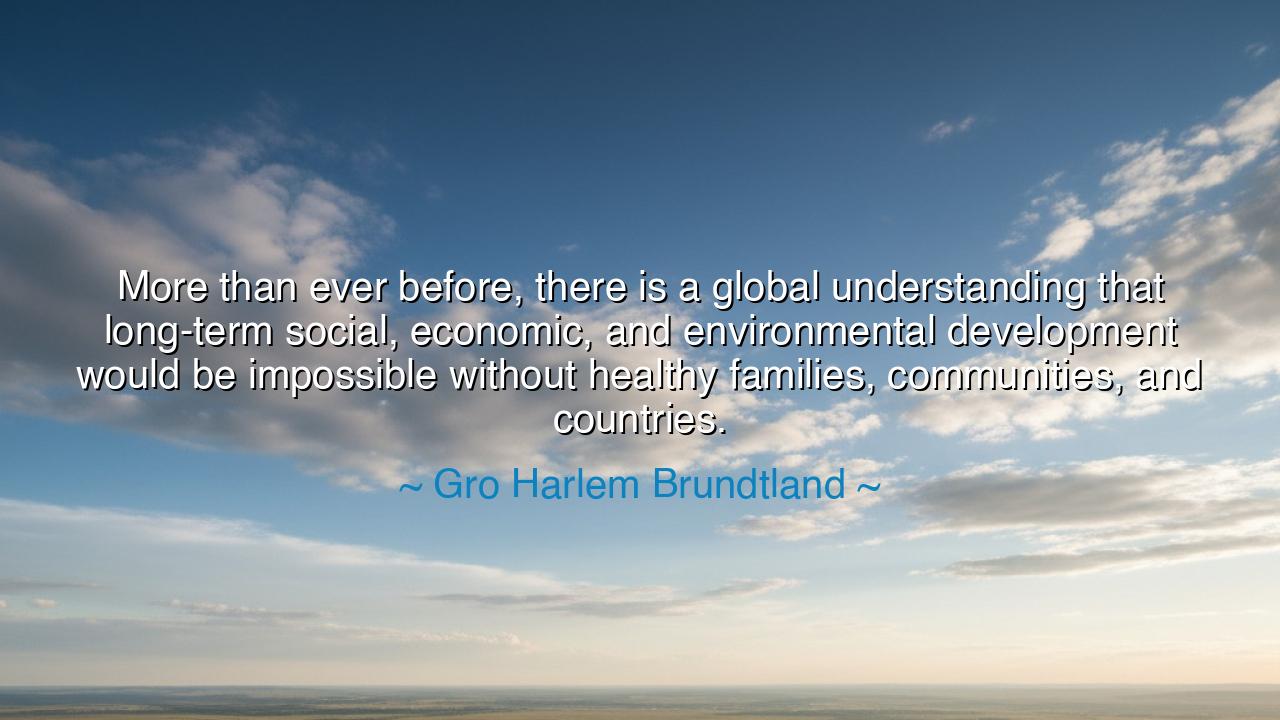
More than ever before, there is a global understanding that
More than ever before, there is a global understanding that long-term social, economic, and environmental development would be impossible without healthy families, communities, and countries.






The words of Gro Harlem Brundtland, “More than ever before, there is a global understanding that long-term social, economic, and environmental development would be impossible without healthy families, communities, and countries,” shine with the light of truth that transcends borders and generations. They speak to the deep interconnection between human well-being and the structures of society. For how can the tree of progress grow if the roots—families, communities, and nations—are sickly or broken? Her words remind us that no vision of prosperity can endure if it neglects the foundation of human health and unity.
The origin of this saying rests in Brundtland’s long life of service as both Prime Minister of Norway and later as Director-General of the World Health Organization. Known as the “mother of sustainable development,” she was the guiding voice behind the famous Brundtland Report of 1987, which gave the world a new definition of sustainability: meeting the needs of the present without compromising the needs of the future. In this spirit, she declared that global development is not merely a matter of wealth or technology—it is inseparable from the health of the people who build families, nurture communities, and sustain nations.
History offers us many mirrors of this wisdom. Consider the collapse of the Roman Empire. Its legions, its roads, and its wealth once dominated the known world. Yet as families weakened, as communities fractured under inequality, and as the bonds of citizenship crumbled, no law or wealth could save Rome. The empire’s external glory concealed internal decay. Brundtland’s insight reminds us that true strength does not lie in armies or treasuries alone, but in the health and stability of people’s everyday lives—the hearth, the village, the nation that sustains them.
Her words also draw attention to the truth that social, economic, and environmental development are not three separate paths, but one braided cord. A society may chase riches while neglecting the poor, but soon unrest will follow. A nation may pursue industry while poisoning its rivers, but its people will fall ill. A community may seek advancement while neglecting its children, but its future will wither. Only when families are strong, when communities are whole, when nations honor their people, can development be sustained for the generations to come.
There is also a call to humility here. Too often, leaders and nations imagine that progress comes from grand strategies, towering buildings, or technological marvels. But Brundtland reminds us that the true heart of progress lies in the health of families—whether children are nourished, whether parents are supported, whether elders are cared for. For the greatness of a people is measured not by monuments of stone, but by the strength of its homes and the compassion of its communities.
The lesson for us is urgent and personal. If we wish to build a world that endures, we must begin where life itself begins—with the family, with the community, with the care of our neighbors and the protection of our land. Let us support policies that ensure health care, education, and dignity for all. Let us strengthen the bonds of community, working not only for ourselves but for the good of the whole. And let us treat the earth not as a storehouse to be emptied, but as a home to be preserved. For in this lies the true path of sustainability.
Therefore, let us live as guardians of the roots from which all development springs. Support families, for they are the first teachers of virtue. Strengthen communities, for they are the shield against despair. Uphold nations, not as instruments of conquest, but as stewards of justice and well-being. And remember always that long-term development is not built in years or decades, but in generations, in the health and dignity of those yet unborn.
So let Brundtland’s words echo like a beacon: “Long-term development would be impossible without healthy families, communities, and countries.” They are not only wisdom for leaders but guidance for every person. For the work of building a better world begins not in parliaments or boardrooms, but in the home, the neighborhood, and the nation that together make the earth a place where humanity may flourish.






AAdministratorAdministrator
Welcome, honored guests. Please leave a comment, we will respond soon